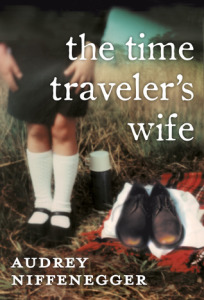 Proof that Sentimental Claptrap Sells
Proof that Sentimental Claptrap Sells
Audrey Niffenegger (2003). The Time Traveler’s Wife. 534 pp.
I bought this book on a whim, succumbing to marketing hype, and because I do enjoy time travel stories. But it was a huge disappointment.
It’s basically a love story, where the guy, Henry, just happens to be an involuntary time-traveler, unpredictably disappearing into his past or future at any moment. That sounds like a decent premise for an interesting story. The problem is that the time-travel theme is logically inconsistent to the point of nonsense — nothing to learn from it — and the romance is flat and maudlin. Add them up and you got nothin’.
I can imagine a romantic story where childhood sweethearts grow up together, get married, have a kid, face tragedy, then one or both of them dies. The story of life, hey? As a complication, you can imagine that the husband is a traveling salesman, always disappearing from the scene. That puts special stresses on the marriage, something worth exploring. By having Henry be, not a traveling salesman, but a time traveler, serves only to make him omniscient. Otherwise he might as well be off selling industrial pumps. He’s just as absent.
So now you have a relationship and a marriage where the guy is omniscient, as all guys wish they were and often pretend they are. Seems that would be intolerable for the woman, but she is happy to know that her destiny is assured. So, incredibly, the time travel theme has no real psychological effect on the characters.
The characters are flat, unchanging, vapid, and unreflective – not interesting people at all, which is surprising, given their unusual circumstances. I found them boring, not believable, and even unlikeable. Adding scene after scene of hot sex does not make them interesting. Everybody has sex. Make a note of it.
The characters would be interesting if we knew more about their desires and frustrations, hopes and fears; doubts and regrets; and the internal contradictions among their feelings. But these characters have almost no interiority, so who cares what they do or say?
The writing is ordinary, the descriptions bland. Each of the two main characters take turns talking in first person, as if in diary entries. Remarkably, their voices are virtually identical and it’s sometimes difficult to remember whose POV we’re in. Not that it matters much.
There are so many questions that could be considered in the presence of a time-traveler: how would the meaning your of life change with each temporal revelation? What is destiny? What is personal responsibility? How would it change your life to know the time and manner of your death? Is love possible when one person knows the future and the other doesn’t? What would you believe if you thought that life was predetermined to the last detail and nothing could be changed? How would your outlook change if you could go back in time and actually see what really happened, what you really were like, what you really said and did.
None of this is touched. The novel is a sentimental sapsucker with a lame, pseudo-fantasy twist. And it’s a huge international best-seller.
